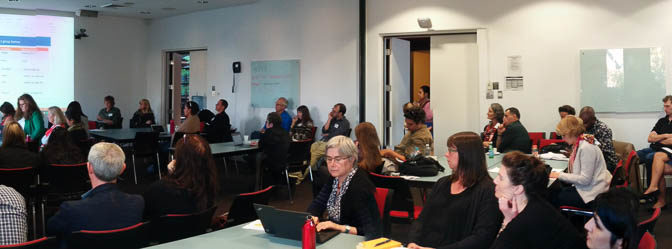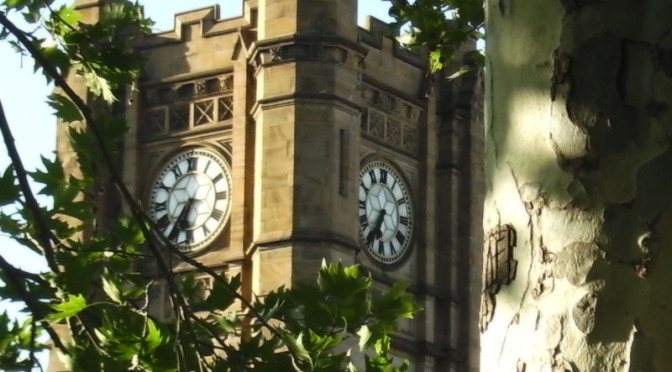Raewyn Connell’s introduction to the People’s Tribunal.
What is neoliberalism?
Neoliberalism is the name widely used for the corporate market ideology that in the last generation has gained a dominant position across most of the world. Originating as a business-led development strategy in the global South, and a business-led attack on the welfare state in the global North, neoliberalism has crystallized as a policy package for re-shaping economic and social life.
The package varies from country to country but has much in common. Typical policies are: selling off public assets to owners of capital (‘privatisation’); abolishing rules restraining what businesses can do (‘deregulation’); reducing public services, or charging fees for them (‘user pays’); weakening unions, removing legal protections for workers, and removing protections for local industries; and lowering taxes on high-earning individuals and companies.
At a deeper level, neoliberalism promotes broad cultural changes. The agenda seeks to expand the reach of markets and profit/loss calculation across social life (‘commodification’). It makes local economies depend on world markets and flows of capital (‘globalization’). It re-shapes public institutions and voluntary organizations on the model of competitive firms (‘public sector reform’). It expands the power of managers, displacing local decision-making and occupational expertise. It tries to re-shape culture to promote selfishness (‘individualism’), ruthlessness (‘entrepreneurship’) and dominance (‘leadership’).
Neoliberal policies have rarely been brought in by popular demand. They usually make the rich richer and the poor more insecure – which is usually unpopular. The agenda has, therefore, mainly been introduced top-down: sometimes by force or legal coercion; sometimes by economic coercion (e.g. the IMF’s Structural Adjustment Programs); sometimes as a surprise package after governments won power for other reasons (classic case being Peru); and sometimes in response to economic panic (e.g. the 1980s in Australia).
For organizations, neoliberal restructuring is typically decided at the top by senior management. It is then imposed through many small but non-negotiable changes in organizational life. This process is often planned with the assistance of management consultants, corporations that make a profitable business of re-organizing other peoples’ workplaces on neoliberal lines. Sudden re-shaping of organizations has occurred (e.g. the 1986 “Big Bang” deregulation of the London Stock Exchange), but this is now rare.
Universities: organizational change
Universities have been caught in neoliberal restructuring in multiple ways. In some countries (e.g. Chile, Brasil) there has been a mushroom growth of private for-profit colleges. In Australia the story centres on the internal transformation of a system of public universities and colleges. A dramatic shift, begun in 1987-88 under Labor Party education minister John Dawkins, has turned a broadly cooperative system into a divisive collection of competing firms. Simultaneously, university administrations began to mutate into corporate-style managerial elites, imbued with business ideology and paid like corporate managers. The top echelon of Australian university managers now get salary packages around a million dollars per year.
Rather than outright privatisation, there has been a steep decline in the proportion of public funding, replaced by fees charged to students. Australia now has one of the lowest levels of public investment in higher education among affluent countries. Fees were re-introduced in the Dawkins era at a low level but have risen ever since. The new corporate managers have latched on to this, and the most powerful of them have recently been supporting complete deregulation of fees, as a way of expanding their income.
In Australian universities, a key part of this strategy was charging higher fees to overseas students, most of whom come from Asia. In the 1990s and 2000s the university sector became, in economic terms, an export industry. To put it more plainly, a higher education system that formerly educated overseas students for free as a form of international aid, has now become a device for sucking money out of developing economies.
The neoliberal takeover produces a different approach to the workforce. A university as a public institution had an interest in keeping and educating its workforce, gaining the long-term benefits of organizational memory and shared know-how. A university as a corporation has an interest in cheap and flexible labour, bought on a market.
One device is to remove chunks of the workforce from the university payroll altogether, by outsourcing their work to other corporations. This is now done for university work ranging from computing, to printing, to security. Academic tenure is a serious constraint on flexibility; so tenure has gradually been eroded. All parts of the university workforce are now vulnerable to sudden restructurings, cuts and purges. These may impact a library at one time, a faculty at another, a professional service at yet another. Across the whole sector, around half of the undergraduate classes are now taken by teachers on fixed-term, casual or other insecure employment conditions.
Promoting selfishness, ruthlessness and dominance tends to break down social trust. It is clear that neoliberal managers in universities now have little trust in their workforce. An important consequence is a growing spiderweb of top-down controls over university staff. Many of these controls are now embedded in management-controlled Intranets.
Staff have therefore been spending increasing amounts of their time complying with online reporting requirements (for finance, marks, research output, etc. etc.), fitting courses into online templates, undergoing performance management, getting managerial permissions (for spending funds, starting a research project, travelling to a conference, etc. etc.). The space for professional judgment, for anyone in universities except managers, has been shrinking.
Cultural change
Equally important, though not so visible, are cultural changes in universities. Managerial prerogative has substantially displaced organizational democracy. ‘Consultations’ are frequently announced but are rarely more than window-dressing.
An ideology of competition – taking a toxic form in restructures where staff have to compete against each other to get back their own jobs – undermines the cooperation that actually makes a university work. Widening anxiety and distrust undermines the commitments that brought many people to work in universities in the first place: the hope of doing work in the public interest, love of teaching, the excitement of intellectual discovery.
The shift to market logic and the search for advantage over other university-firms underlie another important cultural shift: managers now rely on corporate techniques of publicity. Austtralian universities have all acquired public-relations units, and now put resources into corporate image, ‘branding’ and boasting. Mindless slogans proliferate: one university adopted the slogan “Never Stand Still”, another dubbed itself “Australia’s Innovative University”, a third has taken to plastering gems of corporate philosophy like “Leadership is a Culture” across the campus.
The irony here runs deep. An institution whose rationale, both in teaching and research, is the difficult search for truth, increasingly presents itself through dumbed-down advertising that is manipulative, selective, and sometimes outright deceptive.
Australian neoliberalism has produced a culture focussed on short-term profit, and an economy dependent on the short-term benefit of mining minerals. In services such as education, neoliberalism works by mining existing institutions. Organizations that were set up to serve a public interest are restructured to find potential profits. Google calls it “monetising”.
And now…?
The neoliberal takeover of Australian higher education is well advanced. But the process is uneven and definitely not complete. Indeed it is hard to see how it could become complete without destroying the distinctive cultural authority of universities – exactly the resource that the neoliberal agenda is mining. Already there is a disturbing whiff of favouritism and corruption around parts of the Australian university system, and few things could be more damaging.
University managers have taken to calling themselves “The University”, and the Australian Vice-Chancellors’ Committee, in a characteristic move, re-named themselves “Universities Australia”. But it is actually the staff and students who make a university work. Enough remains of commitment to public education, cooperation among the workforce, and concern with truth, to make the universities still function as a public service. That is an important fact.
There is explicit resistance to the neoliberal agenda. Opposition from students and staff to the deregulation of fees (which would mean steep fee rises in the more privileged universities and increasing inequality in the system) found support in Parliament in 2014-15. Industrial action by university staff has become more widespread – which is unusual in the Australian industrial system where unions have been weakened under neoliberalism.
What we still need is a way of changing the institutions in a democratic direction – a long-term vision for public universities, and a practical agenda for the near future.
I think the discussion has to deal with three sets of problems. First, what will a more democratic university look like as an organization? – as a good place to work for all types of workers, as a place of shared rather than top-down decision-making. What are the teaching and learning practices we need for a more satisfying and relevant higher education?
Second, considering the university as a knowledge institution, what kinds of knowledge will be created and taught? What are the research agendas that universities need to pursue, as Australia moves from a colonial past into a turbulent and dangerous future? What will curricula of the future be, if our universities are to be more than retail offices for globalized MOOC vendors?
Third, what are better ways of linking Australian universities to the wider society? Who will be the new participants in university life, a generation down the track? Can we have social justice in higher education, and if so, how? How can universities develop a cultural identity more authentic and credible than the current boasting and brand-mongering?
That’s a large agenda. But the discussion is beginning.
Photo Credit: fa11ing_away via Compfight cc




